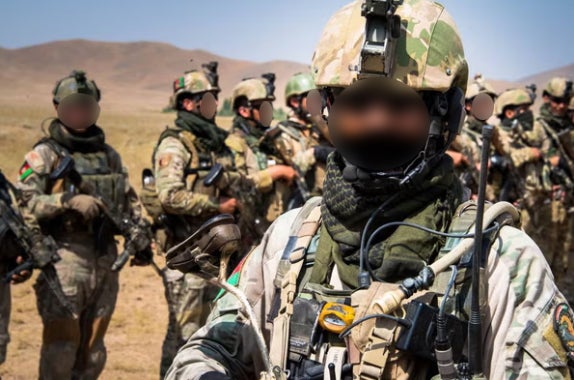The British government has been urged to hasten the relocation of hundreds of Afghan heroes to the UK after Ministry of Defence (MoD) failures saw them left at the mercy of the Taliban.
Thousands of applications for sanctuary from Afghans were rejected despite them having credible links to the UK special forces (UKSF). The High Court heard this week that one UK special forces officer oversaw the blanket rejection of 1,585 cases during the summer of 2023.
Ministers had initially denied that Afghan commandos, known as the Triples, had been paid by the UK government, but were forced to backtrack and announce a review into 2,000 applications.
Around 600 Afghan allies, whose applications were among the initial 2,000 re-examined, have been granted approval to come to the UK.
Now government lawyers have said that a further estimated 2,500 applications have been identified for review after the MoD realised the significance of rediscovered payroll data, paving the way for hundreds more to be brought to sanctuary.
Former veterans minister Johnny Mercer has said that he is “shocked and appalled” by the failings in the MoD’s initial handling of the applications. Campaigners and former military chiefs called on the government to speed up the relocation of these brave soldiers to the UK.
Colonel Simon Diggins, former defence attache in Afghanistan, said that poor records had been kept by the UKSF, impacting the lives of the Triples soldiers.
He said: “We know that these individuals’ lives are in danger. There is a real imperative to do something about it and to do it quickly. The accusation of poor data keeping is fair but now we have some records there is also an imperative to come up with a quicker way of dealing with this [Triples’ evacuation].”

Sarah Fenby-Dixon, Afghanistan consultant at the Refugee Aid Network, said: “It is vital that the review process for all cases is speeded up, as even after being granted eligibility some people are waiting many months or even years before being transferred to safety.”
A former senior member of the Triples, who is now in the UK, has brought the legal challenge against the government’s processing of applications, with the case reaching the High Court this week. Thomas de la Mare KC, for the claimant, argued that guidance on how resettlement decisions were made should be made public and likened the failings to “a crime scene”.
In a witness statement to court, a senior civil servant said a new ‘phase two’ of the Triples review would re-examine “at least several hundred although this may be as many as c2,500 applications”. The MoD said this would likely bring in soldiers who had served in the later years of the conflict in Afghanistan.
Around 130 cases from the initial review will be moved into phase two, lawyers told the court.
The High Court heard how the initial review was prompted after senior civil servants became concerned about how resettlement applications were being decided.
It has since emerged that there was an effective “blanket practice of automatic refusal”, which left these highly trained Afghan soldiers at the mercy of the Taliban.
A particular UK special forces officer was overseeing hundreds of rejections during a ‘sprint’ in the summer of 2023 to rush through decisions, the court heard.
The MoD said that the officer’s approach to decision-making was “lax and unprofessional” and reached “decisions far too quickly”. MoD caseworkers were also “overly reliant” on UKSF personnel, and were “not consistently exercising their own independent judgement”, the government found.
MPs have previously raised concerns about the potential bias of UKSF personnel having power over resettlement of Afghan allies amid an ongoing inquiry into alleged crimes by the UKSF in Afghanistan between 2010 and 2013.
Some of the Afghan commandos who applied for UK sanctuary could be witnesses to the events being examined by the independent inquiry.
Mr Mercer, who raised concerns about decision-making with senior civil servants in early 2024, said: “When I raised what was happening with the most senior officers and civil servants in the UK government, one in particular from UKSF claimed he was offended that I had and it was offensive to the UKSF. He was either lying to my face as a cabinet minister which is serious enough, or is so deeply incompetent he didn’t know.”
The MoD estimates that around 5,000 people were members of the Triples, working alongside the UKSF, during the Afghan war.
General Sir John McColl, the UK’s former special envoy to Afghanistan, said he believed the MoD had “worked really hard to do the right thing for the Triples”. He said it was good that the MoD is re-examining up to 2,500 more cases and pressed for resources to be given to the team in charge of dealing with Afghan cases.
He added that the delay in help was “a combination of the record-keeping not being particularly good and that the withdrawal was as chaotic and fractured as we all recall”.
“We are now nearly four years on since the withdrawal and in that time these people have been in great danger, some of them will have been in harms way as a consequence of the delay, which is very unfortunate”, he said.
Col Diggins added: “If there are potentially 2,000 more people, who with their family members could equal up to 10,000 people, that’s a big number. We have an obligation to them for their service but we need to think differently about how we do the evacuations.
“We also need to ensure that if we are going to bring people from Afghanistan to this country, there are supported by a proper programme of integration when they get here.”


